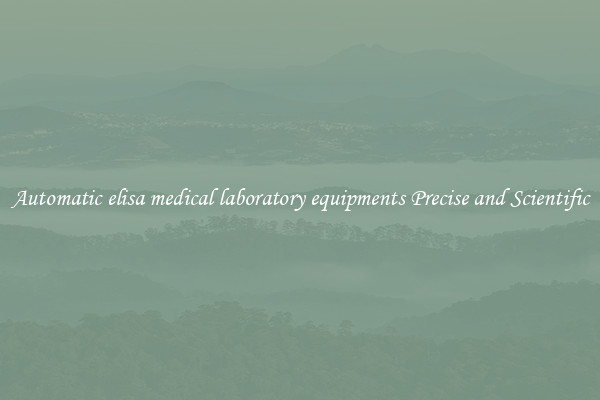Automatic elisa medical laboratory equipments Precise and Scientific
Automatic ELISA (Enzyme-Linked Immunosorbent Assay) medical laboratory equipment has revolutionized the field of diagnostics and biomedical research. In recent years, these high-tech devices have become indispensable tools in medical laboratories, contributing to faster and more accurate diagnoses.

ELISA is a widely used technique that allows scientists to identify and quantify specific proteins or antibodies in a given sample. This method has been crucial in the detection of diseases such as HIV, hepatitis, and various types of cancer. However, carrying out this assay manually can be time-consuming, labor-intensive, and prone to human error.
Automatic ELISA medical laboratory equipment combines advanced technology with precise and scientific techniques, eliminating the need for manual intervention and ensuring accurate results. These automated instruments streamline the process by performing several key steps, including sample pipetting, reagent dispensing, incubation, and washing, in a controlled and standardized manner.
One of the primary advantages of automated ELISA systems is the reduction in human errors. By removing the reliance on manual pipetting, researchers can eliminate variations caused by inconsistencies in technique, thereby increasing the reproducibility of results. This not only saves time but also enhances the overall reliability of the diagnostic process, ensuring patients receive accurate and timely results.
Additionally, automated ELISA systems offer a higher throughput, meaning they can process a larger number of samples simultaneously. This is particularly valuable in clinical laboratories where large-scale testing needs to be carried out quickly and efficiently. By significantly reducing the time required for sample handling and analysis, these automated systems can effectively increase the productivity and efficiency of the laboratory.
Furthermore, automatic ELISA medical laboratory equipment allows for improved precision and accuracy in sample handling. The advanced technology incorporated in these instruments minimizes the risk of cross-contamination, which is particularly vital when working with infectious samples. Additionally, the precise and controlled dispensing of reagents ensures that each well receives the correct amount, reducing variability and enhancing the accuracy of the assay.
In conclusion, automatic ELISA medical laboratory equipment has transformed the landscape of diagnostics by providing precise and scientific results. These sophisticated instruments offer a range of advantages, including reduced human errors, enhanced throughput, and improved precision. With their ability to streamline the diagnostic process, these automated systems contribute significantly to the prompt and reliable identification of various diseases. As technology continues to advance, the future of medical laboratories will undoubtedly rely heavily on these automated devices, facilitating more efficient and accurate diagnoses for patients worldwide.

View details

View details

View details

View details








